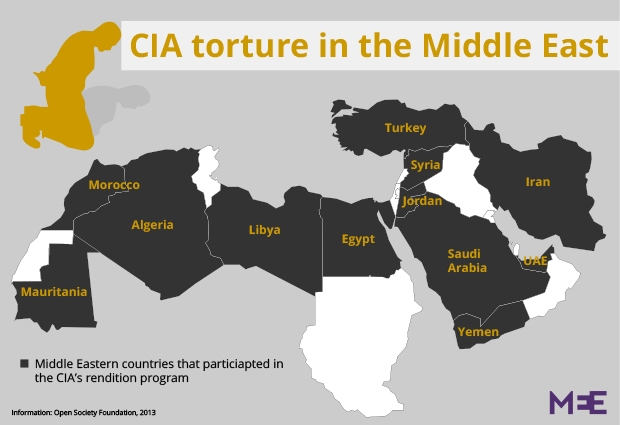Middle East reactions to CIA torture report

The release of the United States Senate Committee report on the CIA’s use of torture to the public has predictably elicited a torrent of reactions across the globe, including the Middle East.
Pundits, journalists and government officials within weighed in with their views on the report, which ranged from condemnation of the torture used to condemnation of the report being released. President Obama, who outlawed torture in his first term, stated that the torture practices on terrorist suspects used were “contrary to our values” and “did not serve our broader counterterrorism efforts or our national security interests.
Dick Cheney, the vice-president in the Bush administration, denounced the report and said that those involved were deserving of praise, not criticism.
“The program was authorized,” Cheney said. “The agency did not want to proceed without authorization, and it was also reviewed legally by the Justice Department before they undertook the program.”
Extraordinary rendition and secret detention were carried out in 54 countries with the full complicity of these governments. According to the Open Society Foundation’s 2013 report “Globalizing Torture: Secret CIA Detention and Extraordinary Rendition,” rendition operations are implemented through a myriad of ways including hosting CIA prisons on their countries; assisting the CIA in the capture and transportation of detainees; permitting the use of their airspace and airports for secret CIA flights transporting detainees; detaining, interrogating, torturing and abusing individuals; and providing intelligence leading to the CIA’s secret detention of individuals.
Ten countries from the MENA region, including Syria, facilitated CIA torture on their territory. Syria is described by the report as one of the most common destinations for rendered suspects, which included detention facilities such as the notorious “Palestine prison” west of Damascus.
Victims of rendition were among those who spoke out.
Moazzem Begg was arrested from his home in Pakistan in 2002 and transferred to the Bagram Detention Facility in Afghanistan, where he was subjected to torture and interrogation, and witnessed two detainees being beaten to death by US soldiers. He was then transferred to Guantanamo Bay before being released in 2005 after no charges were brought against him.
Begg has criticized the lack of accountability that is absent with the publicizing of the CIA torture report, stating that the US’ methods had only served to birth other groups that undertake the same practices.
“Essentially what they did was to set a precedent for these countries to follow,” he said. “In fact ISIS, al-Qaeda, were born out of the dungeons of Abu Ghraib where these torture methods were being implemented and then solidified by the regimes that took over.”
Another victim of rendition, Maher Arar, was arrested in 2002 on his way back from a holiday in Tunisia at a layover in the US. Despite holding Canadian citizenship, Arar was transferred to Syria where he was severely tortured for almost a year.
Arar tweeted:
Individuals in the Arab world took to social media to express their thoughts on the report, with some pointing out the US’ hypocrisy when it comes to human rights.
“The Nazi, barbaric United States has done dirty actions that humans would not have dared to do!” tweeted Taher Mostafa. “Then it gives the rest of the world lectures on human rights and freedom.”
Karl Sharro, a Lebanese architect and satirist tweeted:
“I would just like to point out that a lot of the torture practices described in the CIA report, despite the horrific nature, but many of the detainees in Egypt would actually wish for that,” Fadel Soliman wrote.
Rakan Aref, a teacher and blogger from Saudi Arabia, tweeted:
Sweden stands next to the Syrian and Iranian regimes amongst others in torturing people. Sweden has deafened our ears with its [so-called] humanity and advancement in treating people, even as it imprisons them.
Others noticed the conspicuous silence of their country's state media in reporting about the report, before pointing out that the reason for that was the complicity and participation of their governments in the detention and torture. The general response was not one of shock, but disgust at the details of the various toture practices used, as well as raising questions on whether any of the officials or soldiers involved would be held accountable.
Stay informed with MEE's newsletters
Sign up to get the latest alerts, insights and analysis, starting with Turkey Unpacked
Middle East Eye delivers independent and unrivalled coverage and analysis of the Middle East, North Africa and beyond. To learn more about republishing this content and the associated fees, please fill out this form. More about MEE can be found here.





